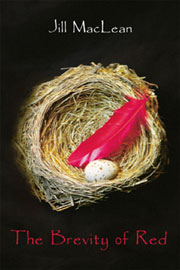
About the book
- Shortlisted for the John Hirsch Award for Most Promising Manitoba Writer
- Shortlisted for the Atlantic Poetry Award
- Shortlisted for the Acorn-Plantos Award
About the author

Born in England in 1941, Jill MacLean moved to Nova Scotia with her family in 1950. After receiving her Bachelor of Science with honours from Dalhousie University, she worked at the Fisheries Research Board in Halifax, in Sydney City Hospital, and in the biology department of Mount Allison University. During the four years she lived in Prince Edward Island, she researched an early French settlement on the island; her monograph was published by the PEI Heritage Foundation. Later, she completed a Masters in Theological Studies at the Atlantic School of Theology, and began writing poetry. She has made her home in all three maritime provinces and now lives in Winnipeg.
Jill's poems have appeared in The Antigonish Review, CV2, Event, The Fiddlehead, Grain, The Malahat Review, Pottersfield Portfolio, Prairie Fire, Prism International, and Tickle Ace. The Brevity of Red is her first collection.
Excerpt
A Stranger in the House
I wish I’d written poems when my daughter
was young. Making wine from dandelions,
I might have glimpsed how heroism
can be quiet, like a child’s breathing.
I have no pencilled scraps, confetti
of an ordinary life. In an old photograph,
she stands beside a little girl, this woman
with my name; I invent dialogue,
embroider the minutes cushioning
that split second. The woman stares at the one
who transfixed her. She dreams of rescue,
polishes the furniture so no fingerprints
remain. She loves her daughter in-
articulately, fears a baby might be
as easily dismembered as a doll:
anoints with lotion, offers oats and milk,
knits scarves that curl inward
tense with prayer. She picks wild
lupins, bringing aphids into the house;
month after month, watches ravens
enter the openwork of boughs. On the wall,
inked lines show how her daughter grows.
Beloved Grotesque
Your gills seal shut. You’re pushed
beyond fish, and — once my waters
break — into the air.
The tidal pool, dependable the whole summer
that you’re two — you’re half in water,
half in air — that great salt lake,
the prolonged sighing
past the range of sand. Sea trout
slippery in your father’s net, do you see
only silver backflips and not
the desperation? Do you remember
capelin funnelling to the estuary, so many
they’re flung upon the shore?
Straps over your swimmer’s shoulders
held the weight of your breasts.
You were driving — highway
shimmering in the heat —
until your eyes swam with sleep.
Do we bury the young as though the earth
were water, wait for them to come up
for air? After your tumbleturns, you surged
from the end walls of the pool,
palms to thighs and toes pointed, bubbles
tasselling through turquoise.
Twenty years have passed. I go
on the assumption that bones are
what’s left: fossae and foramina, your once-
supple spine. The rest of you propels
hydrogen through the mitochondria
of root hairs, sends out small flares
from the yellow rafts
of dandelions. My loafers
lapped by the grass beside your grave,
I breathe in the pleasures
of blue sky:
you’re still anchored,
you can’t entirely float away.
The Day after Father’s Day
It’s water under the bridge…rough trestles
over field runoff, a magnet for the rusty
splinters of swallows. Estranged
implies I treated you as a stranger.
No. I was too adamant.
We were raccoons, masked, clawed
and ingenious. Now that you’re dead,
other old men shuffle down the street,
their eyes afloat under distorting
lenses. Why didn’t I snap
the precisions of your slide rule, yellowed
like the nicotine on your fingers?
I wanted you cruising Mykonos, planting
swirls of Orange Wonder tulips. We were
matching portraits on parallel walls. Once,
you came to stay with me, tripped
over a cord. The lamp crashed to the floor.
That’s not a good beginning, you said.
In the nursing home, you swept the air
with your stick. Why can’t I go
to Florida? A snapshot from your mediocre
boarding school: your mouth clamped, desk
gouged. Years later, I knitted you diamond
socks in your school colours —
sky-blue, red and purple —
and you wore them.
You apprenticed as an aeronautical engineer. Young
and able-bodied, you took the train to and from work
for the six years of the war. You were sole
provider for a family of four; held
animated conversations with yourself. You sent
your two daughters to university: girls
should have something to fall back on.
When I came to tell you my sister, your daughter
had died, you said I feel lonely. The only
words from the heart you ever spoke to me and
I left, left quickly, left you alone. Grief
is a burden; regret goes backward
through weeping toward speech. You
retched as you eviscerated our wartime,
fondly named hens. Near the end,
I fed you creamed chicken. I love you,
I said, from across the private room,
the words flavorless yet firm. You replied
in kind. It was a formality. Swallows drink
on the wing from water the colour of their nests.
Many Years after Your Death
For Ann, my sister,
whose name means grace
Don’t the scars on our bodies
matter? Between the lines in my palm
a punctuation mark neither turquoise
nor mauve, too blurred to end a sentence:
when I am five and you eleven, you stab me
with a pencil, consider me a worthy
enemy. Later, you wrestle with no one
but yourself, conceal your dislocations,
fold your voluptuous
feathers. Your shoulder blades,
at the last, are sharp as harrows
in thin, yellow soil: you grow
in your own way toward
your name, listening for the blue
trumpets of morning glories,
honeysuckle’s pale trombones.
You were my vanguard and my elder,
whole chapters of my story vanished with you.
Among the blemished leaves,
fragrance of pears, soft bedlam of the doves.
Coda
Years after my sister’s death, her daughter
and I travel to a funeral. We’re wearing black,
my jacket fuchsia, hers burnt
orange. Afterward, we drive north
to the beach. It’s a day for children:
blue sky, green fields, flocks of
dandelions. Great blue herons
in a cove, their antiquated
patience, the throat of one tumoured
with a living fish: it’s a day for the dying.
Grey wings scattering light’s
silver scales. Winter rye in rows
of undotted i’s. The black paws
of a red fox. She asks about her mother’s
illness. I tell her what I remember. Then
I tell her about the portrait I saw years ago
at my uncle’s house in Surrey: head
of a Japanese man surrounded by red and purple
anemones. And how, recently, I saw the painting
again. Around the man’s head are seedpods
of lotus, sienna and mud-brown,
oriental characters elusive as salamanders:
it’s a day for memory, for chameleon
and shaman. We take off our shoes,
shed our jackets, spread our arms
like the wings of cormorants. It’s a day
for my niece and me. Orange and pink
banners. The white breakage of ocean.
Reviews
“The Brevity of Red is a book of poems that charts the landscape of grieving and of love. In the midst of a poem, in the heart of loss, this poet gestures to the sky, to the trees, graces us…” >>
— Sue Goyette
“In poems that range from galaxies to mitochondria, from the brutalities of accident to the smiles of belugas, Jill MacLean's first book tracks an exhilarating sweep of lived experience. With image after image — whooping cranes feeding through holes in…” >>
— Brian Bartlett








 Back to top
Back to top